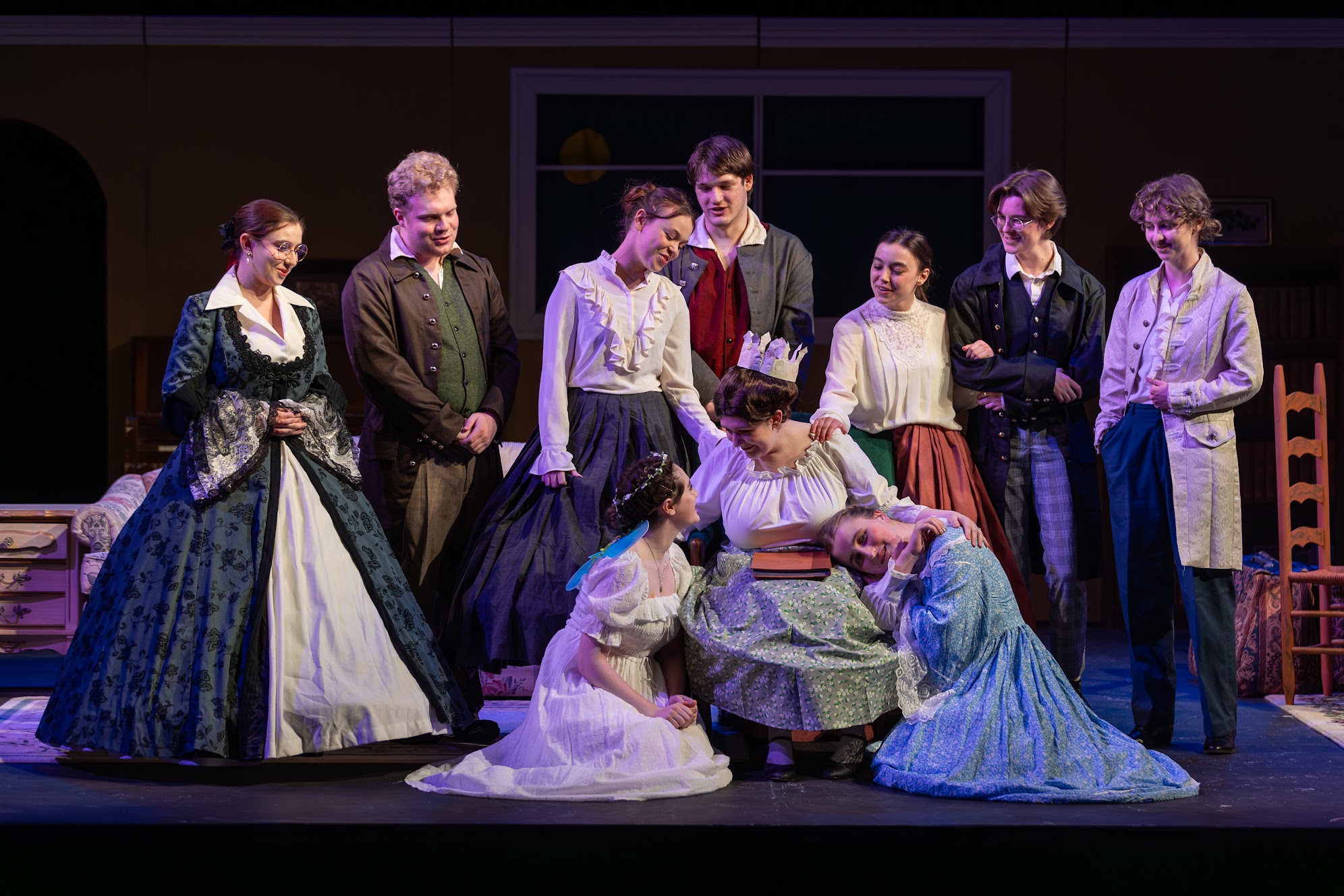Photo courtesy of Michelle Johnsen.
In all transparency, it’s impossible for me to be unbiased in this review of the Green Room Theatre Club’s production of Little Women, as I was the assistant director of the show. But I did feel as though the production should be highlighted, and I have no problem doing it myself!
Let’s start with the logistics. The production took place in the Green Room Theatre from Thursday, April 11th to Sunday, April 14th, 2024, with four ticketed shows open to F&M campus and family members, as well as a fifth show open only to local middle and high school students and their teacher chaperones.
As the GRTC is a student-operated club, the entire show was designed and created by all of us! Little Women was directed by Aviva Katz ‘24, and assistant directed by Emily Hanson ‘25 (that’s me!). Aviva and I also designed the costumes and wrote/adapted the script. The stage manager was Anna Waldstein-Torres ‘24, and the assistant stage manager was Leah Sirota ‘27. Gavin Vogel ‘24 and Jenny Zhang ‘25 designed the props, Devin Simitz ‘26 and Jenny Zhang ‘25 designed the sound, and Vienna Greenlee-Brown ‘25 designed the lighting. Anna Waldstein-Torres also designed the set of the show.
The cast included Gabby Cielo ‘26 as Jo March, Olivia Clay ‘25 as Meg March, Sarah Quirk ‘27 as Amy March, Gray Jabaji ‘27 as Beth March, Cassidy Farley ‘24 as Marmee, Ryan Squires ‘24 as Father, Julia Rinaudo ‘24 as Aunt March, Micki Moore ‘24 as Theodore “Laurie” Laurence, Aislinn/Amadeus Wallin ‘24 as John Brooke, and Luke Murphy ‘27 as Professor Bhaer.
If you have met any of these people, then you don’t need me to tell you that the show was exceptional. The performance you (hopefully) saw on stage was a product of months of hard work from everyone, and it definitely paid off.
For those of you who didn’t come to the show and/or are unfamiliar with the story of Little Women, the original novel written by Louisa May Alcott tells the story of the March family in the 1860s, consisting of four sisters, their mother and father, and their father’s aunt. The family is no longer as wealthy as they once were, but they make do and learn to live kindly and adventurously despite their setbacks. The story also highlights friends (and perhaps some eventual lovers) of the March sisters, and some valuable lessons learned by everyone as time passes. I cannot recommend the book highly enough if you have not read it.
Our version of the script is very similar, drawing direct lines in most cases from the novel. We, unfortunately, were limited in our storytelling ability; our play slightly reduces the amount of characters in the source material and sets the story entirely in the March family living room (in Concord, Massachusetts). This means that some of the adventures taken by the girls in the novel (in Europe and New York, for example) could not be represented on stage. This proved to be a directorial challenge, in which we figured out how to navigate and convey this character development and passage of time to the audience. Thus, in the GRTC production, Act 3 took place three years after Act 2. In Act 1, the sisters are celebrating a rough Christmas without their father or much money to buy presents. In Act 2, the girls get their father back, but Jo is disheartened by the rapidity of changes that begin to happen in the family. In Act 3, the fragmented family returns to celebrate their mother’s birthday, with a new friend and some special news from members of the family.
Luckily, with me as your reviewer, you get some information that you would not have been privy to otherwise. This includes the aforementioned fact that the director, Aviva Katz, and I adapted the Little Women novel into our own play script, and also designed costumes for the show. Don’t worry, this is certainly not bragging; I would love to say that I merely assisted the director here and there, and breezed through the semester until the end of the show. But I can’t lie, so I will tell you that neither of those plans were intentional from the start. Many aspects of this process overall weren’t always smooth sailing, and it was a labor of love for everyone involved. But I also know that the endeavors you pour your entire soul into also end up meaning the most to you. And Little Women is not an exception to that.
Despite the story being set in the 1860s, its themes are timeless. The cast did an incredible job conveying the true meanings of Little Women on stage, like strong familial bonds and growing up, with acting choices that made me laugh and cry during every run. The crew made incredible and fitting choices as well, and we could not have managed without them. This was not an easy production to pull off, by any means, but I know that we succeeded! I am incredibly grateful for the effort and love given by everyone involved. To those of you who came to see the show, thank you for showing us your love, and I hope you enjoyed it!
Junior Emily Hanson is the Arts and Leisure Editor. Her email is ehanson@fandm.edu.
